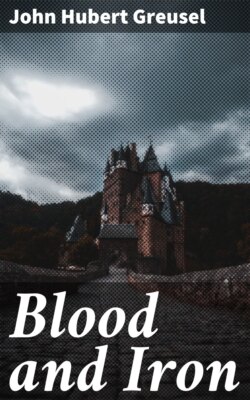Читать книгу Blood and Iron - John Hubert Greusel - Страница 13
На сайте Литреса книга снята с продажи.
6
ОглавлениеStrong animal basis of Bismarck’s rise to Power—The story is always the same, “Fight, or die like a dog!”
¶ Thus, from time immemorial, the fighting Bismarcks wrote their title to a share of this earth with the sword, which in spite of all Hague Conferences remains the best sort of title man has been able to devise.
As time sped and what is called Civilization grew somewhat, men took on chicken-hearted ways; and in every pinch appealed to courts for decisions formerly decided by individual brawn; till finally, as in these latter degenerate days, if a fight becomes necessary, society hires policemen to stop the row.
¶ Klaus von Bismarck preferred to do his own murdering, and consequently, Klaus stood first in the eyes of honest men of his own generation; but in this Twentieth Century, instead of putting incompetents to the test of the sword, society, committed to the soft doctrine that all life is sacred, burdens itself with lengthening the days of the daft. A far cry that from the ideals of the early Bismarcks! It is well to keep these facts in mind, in contemplating the extraordinary career of the great Otto von Bismarck, king-maker and unifier of Germany.
¶ Modern timid-hearted folk, reading of the desperate makeshifts of the old Bismarcks to get on in the world, would say off-hand, “There must be a strain of madness in the Bismarck brain?”
¶ Unquestionably! This fighting family in each generation had its born revolutionists, its enormous egotists, its men who lived what orthodox opinion calls “godless lives”—although in their own philosophy the Bismarcks are always preaching that God is on their side. When the Elector decided to steal Burgstal forest, the Bismarcks set up this pious plea: “We wish to remain in the pleasant place assigned to us by the Almighty.” Four hundred years later we find Otto von Bismarck using again and again this peculiar reasoning, to justify, at least to explain, his own career: “If I were not a Christian, I would not continue to serve the King another moment. Did I not obey my God and count on Him, I should certainly take no account of earthly masters.”
¶ In three great wars of ambition in which 80,000 perished, he repeated this solemn formula about God; he repeated it on the blood-drenched field of Koeniggraetz; he repeated it in the Holstein war, and he repeated it again at Sedan and at Gravelotte.
¶ Bismarck persisted in this peculiar conception of life, down to the last. While in retirement, after his downfall, one day the bloody past rose before him like a dream, and he exclaimed to Dr. Busch: “Politics has brought me vexation, anxiety and trouble; made no one happy, me, my family nor anyone else, but many unhappy. Had it not been for me, there would have been three great wars less; the lives of 80,000 would not have been sacrificed; and many parents, brothers, sisters and wives would not now be mourners. That, however, I have settled with my Maker!” Now, once and for all, what we understand this to mean is merely this: a super-abundance of faith. Many great leaders have had it—David, Cromwell, Bismarck.
¶ In seeking biographic clues, through hereditary influences, we are impressed with the astounding animal-basis of strength behind the Bismarcks, from earliest recorded history. They were a deep-drinking, prolific gormandizing race, and every mother’s son had to do battle by brawn backed by the sword, or die like a dog! This bred high tempers, turbulent manners and contempt for the weak.
¶ Soldiers, diplomatists, brow-beaters, characterized the Bismarck clan down through centuries. Stormy and adventurous Bismarcks fought for the sheer delight of doing battle;—it mattered not, whether against the Turks or against some near-by king whose lands the German robber-knights lusted for and wished to annex by appeal to the sword.
¶ There is a story of a garrison brawl in which a Bismarck slew his companion in drink, then fled to Russia, then on to Siberia; soldier of fortune, he fights under any flag that promises a gay life and plenty of loot. Three hundred years later—how the wheel turns round!—Otto von Bismarck, as Russian Ambassador to the King of Prussia, engaged in intrigues for the same old lust of land, the same old nefarious business, but this time sprayed over by the high-sounding name, diplomacy.
¶ Dr. Busch, the Saxon press-agent for Prince Bismarck, repeats the old tale of the winning of Alsace by the French king, through the aid of Otto von Bismarck’s great-great-grandfather, a mercenary soldier; adding that while one Bismarck helped take Alsace away, another of that redoubtable family brought it back many years later, with the added joy of the prodigious money-fine of five billions of francs!
